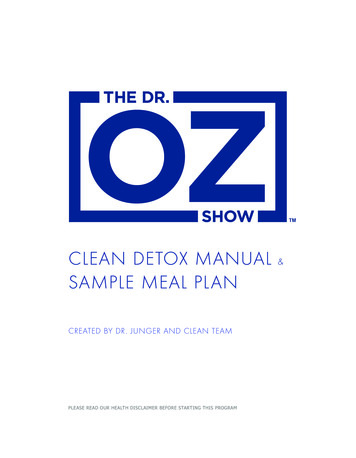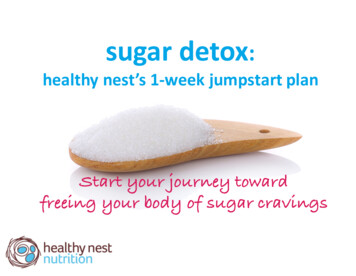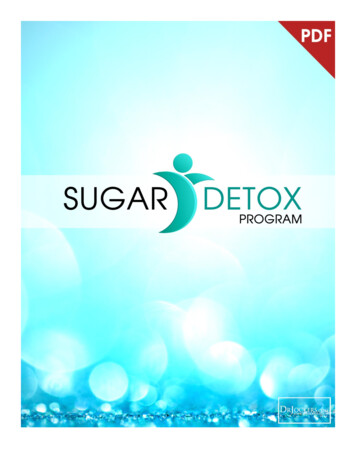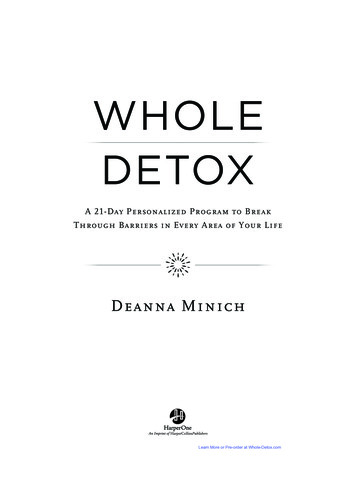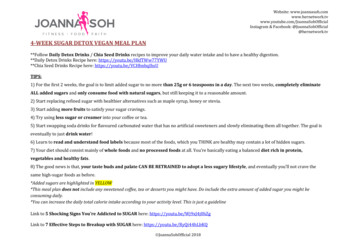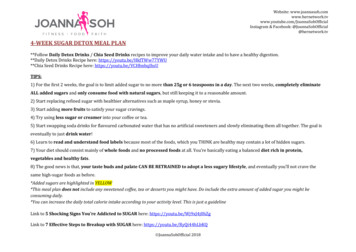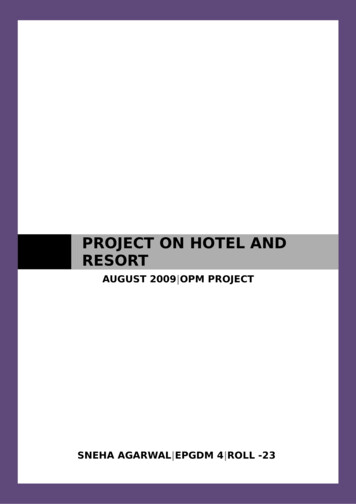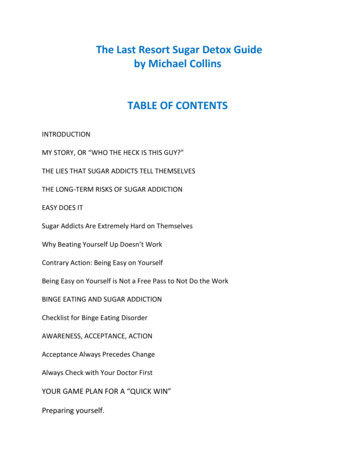
Transcription
The Last Resort Sugar Detox Guideby Michael CollinsTABLE OF CONTENTSINTRODUCTIONMY STORY, OR “WHO THE HECK IS THIS GUY?”THE LIES THAT SUGAR ADDICTS TELL THEMSELVESTHE LONG-TERM RISKS OF SUGAR ADDICTIONEASY DOES ITSugar Addicts Are Extremely Hard on ThemselvesWhy Beating Yourself Up Doesn’t WorkContrary Action: Being Easy on YourselfBeing Easy on Yourself is Not a Free Pass to Not Do the WorkBINGE EATING AND SUGAR ADDICTIONChecklist for Binge Eating DisorderAWARENESS, ACCEPTANCE, ACTIONAcceptance Always Precedes ChangeAlways Check with Your Doctor FirstYOUR GAME PLAN FOR A “QUICK WIN”Preparing yourself.
Take as long as you need.How long you detox is up to you.Preparing your family.This detox is for YOU.Preparing your workplace.Drawing Your Line in the SandChoosing Your Day and Preparing Your Environment“Feel the guilt and DO IT Anyway.”ADDICTION AND CRAVINGS AND WILLPOWER, OH MY!Addiction: No One Wants to Admit to this Ugly WordThe Power of Sugar and FlourCravingsFood Volume as a TriggerTHE MYTH OF WILLPOWERDependency Can’t Be Controlled By Willpower Alone AbstinenceWHAT TO EXPECTThe Benefits of Sugar and Flour Abstinence are VastCravings Will Subside with AbstinenceA Bonus Side Note and a Vision of the Future about the Growling StomachWITHDRAWALS
What to Expect with WithdrawalsHow to Cope with WithdrawalsDay-by-day Outline of Walking through and Managing WithdrawalFOOD PLAN FOR RECOVERYBenefits of Following the Food PlanNSFW: No Sugar, Flour & WheatJOURNALING: A TOOL FOR SUCCESSThe Importance of Rigorous HonestyBODY IMAGEAcceptance at All WeightsSELF-CARE AND EXERCISE: WORKING OUT AND WORKING WITHINExamples of Self-CareEXERCISE: IT’S NOT WHAT YOU THINKHow Exercise Helps in Recovering From Sugar AddictionHow to Create a Realistic Exercise PlanMEDITATIONBenefits of MeditationHow to MeditateYOU CAN’T DO THIS ALONE: OUR SUPPORT GROUPSuccessful People Never Do It Alone
A Word on 12-Step ProgramsCONCLUSIONINTRODUCTIONWelcome to The Last Resort Sugar Detox from the Original SugarAddiction.comCongratulations! You’ve just taken the first step in the process of helping yourselfout of the sugar prison you have been trapped in for years or even decades. Ittakes a lot of courage to look at this, or any, habit or dependency in the face andmake a commitment to change.We hope that within this book you will find understanding, compassion, guidance,and, most of all, hope.Please take comfort in the fact that you are not alone.We take our stewardship of SugarAddiction.com very seriously and strive to offereveryone who visits our website the very best information, community, andsupport to assist people in the process of gaining control over sugar and your life.As the science around sugar and how it affects the body increases, almost daily,we know that this topic will be of great interest to folks worldwide for many yearsto come.Having been there ourselves, we know exactly how you feel. We are not a bootcamp. We are not a diet. We are not a fad. We are here to bring you cutting-edgeinformation and support for a confusing topic that is causing immense pain tosome - worldwide.You’ve already taken the first step by seeking out help. This book is intended towalk you through the process of change and recovery. We want you to live ahappy and fulfilled life, free from the physical and emotional chains of eating toomuch sugar, and we can help you achieve this goal.Step two, if you haven’t already done so, is to join the private Sugar Detox DailySupport Group on Facebook.
Just request entrance and our administrators will approve you if you’ve purchasedor downloaded this book for free.** Book Bonus ** We’ve also just uploaded and incredible Masterclass thatmirrors this book in many ways. So if you’re interested in watching a short videoabout sugar detox that busts all the myths around detoxing and helps you makesugar control or sugar freedom a reality in your life (a lifestyle - not a fad diet)then just check it out right here at the top of the page.My Story, or “Who the Heck is this Guy?”It all started with caffeine I remember working in restaurants and bars to pay my way through college, andas the bartender, all the employees had to come through me to get their drinks.The drinks were free - so a strange dynamic developed as folks could drinkunlimited amounts and cost was not a factor.I started to notice a strange observational phenomenon: it didn’t matter if it wasthe 16-year-old busboy or the 60-year-old cook—the folks that drank the mostcaffeine developed dark circles under their eyes, and it was relative as to amount.The people with the largest habits had the darkest circles under their eyes.That awareness began a lifetime of personal exploration into the substances weput into our bodies.It also led to my personal recovery from alcohol and drug addiction (anotherbook—currently in the works), flour and sugar dependency, and even a few more.Early in my recovery from drugs and alcohol, I started to notice that caffeine andsugar were present at a lot of the support groups. Every meeting and every eventwas a sugar and caffeine smorgasbord.Then I noticed that all the new folks started to pack on what is commonly called incollege “the freshman 15” - myself included.
Addiction professionals will tell you about “substituting one drug for another,”and it seemed very obvious to me that everyone was substituting sugar andcaffeine for their drugs of choice. The obvious also happened, the freshman 15got much larger for many, many folks.When I would talk about flour, sugar, and caffeine, people took to calling me the“weird addiction” specialist. They weren't really interested in my thoughts andtheories as long as I was staying clean and sober from what they considered“harder drugs” and alcohol.As my recovery advanced, I eventually quit caffeine, and then sugar and then flourmuch in the way I describe here in the book. The only difference was, eventhough I was surrounded by addiction-savvy people, my journey was pretty muchalone.The one thing, along with years of research and trial and error, that cemented mybeliefs in this subject was the pregnancy of my wife and the birth of mychildren—identical twin boys. By some miracle, my wife bought into my beliefsand vowed with me not to eat flour or sugar or ingest caffeine during thepregnancy.Just as a point of interest, for the moms or moms-to-be, she delivered just shy of14 pounds of baby(s), 6.9 ounces each, and she gained a grand total of 20 poundsduring the pregnancy.We then raised the boys without sugar, flour or caffeine for the first six years oftheir lives. After that, about once a month, we would allow them to eat it at otherchildren’s birthdays but never at home. Yes, it was crazy hard convincing andeducating family members, school officials, and babysitters, but I believe with allmy heart that it created much healthier children.A quick story about withdrawals from sugar and the reactions it has in the bodyinvolving the kids.My mother once told me I was a “perfect angel” as a kid. My response, likeeveryone who would hear that - gosh thanks, mom! But she didn’t stop there. Shecontinued to tell me a story about falling asleep.
Apparently almost every time I would fall asleep my hair would get soaked withsweat and I would form this perfect little halo in my pillow! She thought nothingof it, she just thought it was cute.So remembering that story I always watched for the little halo on my kids. It nevercame. Until that one day, I remember it like it was yesterday. We were at a rollerskating rink for yet another child’s birthday party. The cake and ice cream cameout. Both my boys, at the same time craned their necks toward us as if to say “canwe please? Can we please?”We just gave in. Six years of a battle with friends, parents, school administratorsand our own families just seemed like too much (we regained our resolve the nextday).I know you can guess what I’m going to say next though That evening I went into the boy’s room and guess what I see for the first time?You guessed it - two perfect little halos and soaking wet hair. My boys were insugar detox! (More on this in the withdrawals section.)I consider myself a smart enough guy folks, but my boys are rocket scientistsmart.One of them got a perfect score on his original SATs and his brother missed justone question. My scores and those of their mom were much closer to average. Ibelieve that their brains just developed better because they were free of sugarand the science is just now bearing that out.On the other end of the spectrum, my parents both died of Alzheimer's, which isnow starting to be called “Type 3 Diabetes.” I can’t necessarily prove to you thatsugar caused this, but my dear mother has been a sugar junkie her entire life andmy father joined her after he slowed down his drinking. There are studies nowthat have speculated on this.I believe that one day, in the advancement of human history, 200 years from nowwe'll look back and say things like “Did you know they used to give sugar tochildren?” Much like we say now “Did you know they used to put cocaine in CocaCola?”
For most of human history, people have come together as a community or tribeto pass on information and provide support in order to tackle things that we“know” but can’t seem to “do” without help.This book and SugarAddiction.com serve to continue that tradition. I hope you’lljoin us so that we can help each other to change your life and the lives of themillions of people affected by this terrible dependency.If you still have any doubt, after going online and researching a little aboutsugar, researching books, finding this one and ordering it - that you may have anissue with sugar - feel free to take our very short, yet very effective, free sugarquiz right here.THE LIES THAT SUGAR ADDICTS TELL THEMSELVESLike anyone suffering from a bad habit, dependency or addiction over which theyseem to have little or no control, people with even a mild sugar dependency havea constant script that runs through their head on a loop that criticizes, scolds, andhumiliates them.That inner voice causes them to eat sugar compulsively just to shut it up, but thatmoment of relief is fleeting—and the pleasure in eating usually has more to dowith quieting the internal monologue than the sugar itself. Most, if not all, ofwhat this inner critic is telling you is a big pack of lies.Sugar increases the production of dopamine, which stimulatesthe reward system of pleasure. This stimulation is oftenshort-lived and leaves us wanting more.Here are the most common lies that sugar addicts tell themselves: Eating sugar will make me feel better.
This is the last time.Since I can hide it from other people, it’s not really a big deal.As long as I only binge eat on the weekends, it’s not out of control.I just did XYZ—I deserve to celebrate!I’ll start that diet/exercise program tomorrow.I’ll exercise for two hours to compensate for the box of donuts I just ate.I am only loveable at a certain weight/nobody loves me/I’m completelyunlovable.If I can’t have a perfect relationship with food then it’s not worth eventrying.Since I don’t eat SUGAR all the time, IT isn’t really that bad.I just need to have stronger willpower.Something is very wrong with me.I’m a failure.I have a successful career, so this means that I don’t have a real problem.Find out if you are a sugar addict. Take the quiz here!THE LONG-TERM RISKS OF SUGAR ADDICTIONMany people over-satiate themselves now and again—we all know thatuncomfortable feeling of eating too much—but regularly doing this long-termputs you at risk for health problems. According to Nancy Appleton, the granddame of sugar educators, these are some of the physical consequences of overconsuming sugar (her list is actually over 140): high blood pressurehigh cholesterolheart diseasetype 2 diabetesgallbladder diseasesleep apnea or insomniaedemakidney diseasedegenerative arthritisinfertilitysome types of cancer
irritable bowel syndrome (IBS)fibromyalgiaThe good news is that the sooner you get help, the better your chances ofrecovery.EASY DOES ITAs you read this book, I want you to be kind to yourself. We find that sugaraddicts are remarkably hard on themselves. Really hard. In fact, downright mean.One thing we have found, time and time again, is that "beating yourself up" (yes,a medical term) is of absolutely no help.Look at it this way: if beating yourself up worked, you’d be A-OK right now.The thing to keep in mind is that you didn't get here in one day and you won'twalk out of here tomorrow. But if you make a personal commitment to caring foryourself first and foremost, then you stand a much better chance of recoveringthan if you constantly berate yourself.Beating yourself up stops today.Listen here to the affirmations now to stop beating yourself up!Sugar Addicts Are Extremely Hard on ThemselvesPeople who qualify as a sugar addict or as a binge eater tend to be unusually hardon themselves. This is not only very destructive but may, in fact, have been acatalyst for this symptomatic behavior in the first place . Self-care is just asimportant as discipline—maybe even more so—because you won’t overcome anydisorder if you can’t care for and about yourself in every way.Later in this book, we will be instructing you to do small, kind things for yourself.At first, they will seem ridiculous (you might even feel like that Saturday NightLive character Stuart Smalley!).
But here’s the key: do them anyway. Self-care is the core, the very foundation, ofhelping yourself walk through and out of this hell and it should not beunderestimated. Just as your destructive behavior developed over time, you’llneed to be patient with yourself as you practice being kind to yourself.What follows is a comprehensive plan to change your behavior around sugar andfood.This plan may sound daunting or frightening, but countless others have faced thesame challenge and been victorious.You can do it, too! You’ll have to do the work, and it won’t always be easy, but itis possible and it is imperative for your health—physically and emotionally.You’ve already cleared the first hurdle by reading this book so far, so give yourselfa pat on the back for that. As far as we’re concerned, you are already beginning totriumph over sugar.If you’d like a deeper look into what to expect on this journey check out a clipfrom our video course, which is a compliment to this book, entitled “What toExpect.” It’s FREE to check out right here.Why Beating Yourself Up Doesn’t Work“God, you’re so stupid!”“What a big, fat loser you are.”“You never do anything right.”“Do you know how grotesque you look right now?”“No wonder no one loves you.”Do these phrases sound terrible to you? Of course, they do! Yet we say them toourselves all the time. If our friends treated us the way we treat ourselves,chances are we would walk away from them.
So the next time you berate yourself, listen to the words your inner critic is sayingand then imagine saying the exact same thing to your best friend. Isn’t that aheartbreaking image? In many cases, it would even be considered verbal abuse.So why are we so willing to treat ourselves this way?Believe it or not, this inner critic is just doing what it believes is necessary toprotect us and ensure that we are safe. It comes down to basic survival skills inthe face of danger—or in many cases, perceived danger. The biological “fight orflight” response that we feel when threatened (whether the threat is real orimaginary) is designed to ignore the pain, danger or risk of death and do what isnecessary to motivate us into surviving at any costs.Just as beating someone else up, physically or emotionally, never works, beatingourselves up is also futile. Let me repeat this very important concept: if beatingyourself up actually worked, you’d have stopped using sugar years ago.Beating yourself up never works.Contrary Action: Being Easy on YourselfSo if beating ourselves up isn’t the answer, what is? Simple: loving ourselves.Having compassion for ourselves. Understanding that we have simply been doingthe best that we could given the circumstances—and by circumstances, we meannot fully comprehending the severity of our disorder and not having a place toseek help.Contrary action is any action that is, quite simply, different from what you’dnormally do. The idea behind this concept is that you have been making decisionsfrom the part of your mind that may be unhealthy or untrained, so if you want tomake healthy choices, you can’t rely on this part of your mind.You must allow your mind to make its default choice and then do the opposite.And yes, it will feel unnatural and uncomfortable and wrong. At first. Buteventually, as you get used to this new dynamic, making healthy choices willbecome second nature to you and feel more comfortable.The first contrary action we are going to ask you to perform is to be easy onyourself. Cut yourself some slack. Be proud that you have sought help. Take adeep breath.
Being Easy on Yourself is Not a Free Pass to Not Do theWorkMany people cannot fathom being easy on themselves because doing so feels likethey’re not taking their situation seriously. They’re afraid that they or, moreimportantly, others will assume that they are condoning their sugar addiction.So let’s be clear here. Being easy on yourself isn’t a free pass.It doesn’t mean that you don’t take this disorder seriously. It doesn’t mean thatyou get to avoid doing the work. It doesn’t mean you condone your behavior andinvite more of the same into your life.Being easy on yourself just means that you are human, you deserve to be loved,and you get to practice compassion for this vastly serious disorder from which youare suffering.If you’re a video watcher, instead of a reader, you might have an interest in anincredible Masterclass we shot to answer questions. It mirrors this book inmany ways. It’s a short video about sugar detox that busts all the myths arounddetoxing and helps you make sugar control or sugar freedom a reality in yourlife please check it out. It will give you a great overview of the book and you canalways refer back to the book for the nuts and bolts specifics. Watch it here forfreeBINGE EATING AND SUGAR ADDICTIONA related and sometimes co-occurring malady, Binge Eating Disorder, sometimesaffects sugar addicts.Binge Eating Disorder is not just overeating, having cravings now and again,indulging in dessert during the holidays or on special occasions, or eating toomuch when you are hungry.
The typical binge eater is very similar to the alcoholic in that once she’s had thefirst “drink” (cookie, donut, chip, etc.) she spirals out of control and can’t stopuntil the whole thing is gone.He may sneak into the kitchen in the middle of the night to devour an entirecarton of ice cream while standing up in the light of the refrigerator. She is usuallyplotting out her next rendezvous with her food of choice, including which store orcafé she will stop at to stock up. She may turn down invites from people, go homeearly to seek comfort in a bag of cookies, or feel resentful of people who can stopeating after one piece, handful, or bite.This cycle repeats itself again and again, with vicious bouts of guilt, self-hatred,despair, and hopelessness. The binge eater may or may not promise herself thatthis time will really be the last time, but because of her powerlessness over thiscondition, it never is—even as she gains weight, suffers from health problems, ordamages relationships.Binge Eating Disorder is compulsive and it’s emotional. But at its core, it has a verystrong relationship to sugar addiction as most people binge on sugary products atleast partially. More about binge eating hereChecklist for Binge Eating DisorderEveryone occasionally overeats—especially during the holidays, when they’reunder stress, or in social situations. But consuming large quantities of food orbeing overweight does not necessarily make you a binge eater.Professionals agree that in order to be diagnosed as a binge eater, a person has toexhibit the symptoms listed below at least once a week for more than threemonths: Overwhelming feelings that you cannot control what you are eating orhow much you are eatingRecurring incidents of eating very large amounts of food in one sittingEating much faster than you normally would (in front of other people)Eating to the point where you are uncomfortably fullEating an excessive amount of food even though you don’t feel hungryphysically
Recurring incidents of eating alone due to embarrassment at theamount of food you are eatingOverwhelming feelings of shame, guilt, disgust or depression because ofwhat you have just doneMassive variations in your weightLow or no self-esteemNoticeable decrease in sexual energy/desireThe desire to try various dietsIf any of these symptoms apply to you, please do not feel bad. Awareness is thefirst step to finding a solution to any problem in life. The fact that you are readingthis book shows that you are a smart individual who cares enough about yourselfto take responsibility for and seek positive change in your life. You are much morethan merely a group of symptoms, so go easy on yourself as you continue readingthis book. Compassion for yourself is just as important as courage; in fact, theyare synonymous.To better assess if you might be at risk for Binge Eating Disorder, take the freebinge eating quiz here.AWARENESS, ACCEPTANCE, ACTIONChances are if you have tried to stop eating sugar and were unsuccessful at it, it’sbecause you attempted to jump straight to the solution. You may have thrownout all the tempting food in your kitchen. You likely went on a diet. You mighthave even tried socializing only with people for whom food wasn’t a problem. Youbribed yourself with a reward if you managed to not eat sugar for a week.But before you even think about the solution, you must be truly and fully awareof the problem.Otherwise, you’re just in denial, and being in denial makes you susceptible tobeing sucked back into the problem again. Being fully aware of the issue meansunderstanding how you came to binge eat or use lots of sugar in the first place,what’s going on at a deeper level. (It is not really about sugar.)
Only when we’ve become sincerely aware of our situation can we move on toacceptance. This concept is often a difficult one to embrace because, as wementioned earlier, most people mistake accepting a situation for condoning it.Let’s clear this up right now. To condone is to approve of something that isconsidered wrong and allow it to continue. To accept something is simply to agreewith reality. All we’re asking you to do is to agree with reality, which may soundsomething like: “I may have a slight sugar dependency” or “I have an unhealthyrelationship to sugar.”Once we’re aware of our problem and accept that we have this problem, onlythen can we effectively take the actions necessary to solve the problem.Acceptance Always Precedes ChangeA final word on acceptance. It is a fundamental truth that acceptance alwaysprecedes change. Being able to accept yourself, your struggles, your past, youremotions, and your setbacks—not to mention your successes, your future, yourself-worth, and your happiness—is the key that unlocks the door to recovery.Stop fighting yourself. Stop fighting reality. Accept and love yourself just the wayyou are, even when it seems ridiculous, uncomfortable, and counter-intuitive. Infact, especially when it seems ridiculous, uncomfortable, and counter-intuitive.Always Check with Your Doctor FirstBefore starting any physical change (diet, exercise), always check with your doctorfirst to ensure that any existing or potential health problems aren’t triggered. TheMayo Clinic suggests checking with your doctor if any of the following apply: You have heart diseaseYou have asthma or lung diseaseYou have diabetes or kidney diseaseYou have arthritisIt’s doubtful that many docs will have too much of an issue with you taking abreak from sugar but please ask first.YOUR GAME PLAN FOR A “QUICK WIN”
There are a few other things you need to do before we get started on the nutsand bolts.There are different preparations you need to take so as to make your detox assuccessful as possible.And there are different people that need to be prepared. It’s not just you!You need to prepare yourself sure, but you also need to prepare your family, yourfriends and your workmates. This will truly take a village.Preparing yourself.The first and most important step in preparing yourself is to determine yourWHY!!Why are you wanting to reduce or eliminate sugar in your life?This step may take some soul searching but it is absolutely mandatory, at thisjuncture, that you sit for a minute and ask yourself WHY you want to quit sugar.Sit with a pen and paper or at a new Word Doc and just list the reasons you wantto quit or control sugar. No thought, just list for now - do it fast and list as many asyou can.Is it for weight loss?Is it because of a diabetes diagnosis?Other health issues?Once you’re finished listing all the reasons then form a “WHY” statement just foryou. See below for an example.Once you’ve determined your “why”, the reasons that motivate you to quit - writeit down. Put it on a 3x5 card, get it laminated and put it in your wallet. Tape it toyour bathroom mirror. Make it your screensaver on your phone, tablet, laptop,and desktop!
In short: do whatever it takes to see this mantra every day.So let’s say your “why” is the following:“I need to quit sugar to stem the tide of this yearly weight gain, finally gethealthy again and to be able to live to see my kids get married and havechildren”That’s a solid why. It tells you exactly why you need to push through the difficulttimes.Once you settle on the reason why it will help if you do this exercise.Sit quietly and visualize your ideal self without sugar. Close your eyes and see and feel exactly what your life would be like whenyou are in complete control of your sugar.See your new body at your goal weight.See and feel how that feels, how you feel in the world.See yourself being able to say a simple and polite no to sugar and mean itthis time.See yourself celebrating one year off sugar and actually look at your NEW self inthe mirror.This little exercise seems silly but it is the basis of almost all personal andself-development programs.Don’t worry: there are lots of actual nuts and bolts - and honestly a little hardwork - to come, but for now I just want you to tap into your imagination and seeyour ideal future.Take as long as you need.“Borrow from the beauty of the future to enroll yourself in theactivities of today.”
Then set a goal.How long you detox is up to you.We suggest 30 days but anything more than one day will help. We will describe anentire 30-day detox but everyone is just a little different.Our Facebook group will help you be accountable. Join here!This a self-paced program. We’re always here to help but eventually you need tobe making your own decisions around sugar.Preparing your family.If you live with others they are going to be intimately involved in this journey.If your kids are young and you have the support of your spouse then this will gomuch more smoothly.But regardless of your circumstances, this is very possible for anyone, in anysituation. Do NOT use your family or living situation as an excuse.We have success stories from moms of four kids and women who live alone. Onlyyou can determine your destiny.But.You need to tell your family what you’re up to.Trying this in a vacuum just won’t work. If there is pushback then you just need tolearn to deal with it right now. (Don’t worry we can help with that, learning tohave these conversations with confidence may be one of the most important skillswe can teach you)Tell them you plan on stopping sugar for a set period of time. Tell them they don’thave to change anything and MEAN IT.The first step in all this is to help yourself.
Now if your family finds that this is something you all want to do as a team thenmore power to you but DO NOT make this a requirement for them or for you!Put your own oxygen mask on first as they say on the airlines. Once you’vemastered the sugar then you can help others.One of the Catch-22’s of this process is that you will need to clean the house outof sugar. Which may or may not be tricky depending on your family's habits. Butwe’ll show you a way to deal with that below.This detox is for YOU.We have entire programs devoted to our graduates helping others and we’d loveto have you as an instructor. But the first requirement is that they master thesugar for themselves.You need to be a little selfish for a time. For most of our clients, this is actuallyone of the hardest parts of the entire process. Taking time for themselves. Notbuying “treats” for the family. (They get enough outside the home - believe me)But please think of this just the same way the airlines do. You truly can not helpanyone until you are first safe on the other side.Preparing your workplace.At work, you can be a little more stealth and stay hidden under the radar. It reallydepends on how tight knit your work group is. If it’s like family and there are lotsof “sugar sharing” events then you’ll need to come clean.The same applies as above with your family.Do not get into the “recruiting people to join you” business just yet.Let folks make their own decisions. If they ask you, and only if they ask you, sendthem a link to this book on Amazon and let the rest go - for now.Seriously just tell them that this is something you need to do and ask them toplease support you.
**Hugely Important Note**This “coming out” - this explaining your new behaviors and actions to yourfamily and others is quite possibly THE most important part of your journey.Your family, nuclear and extended, w
Welcome to The Last Resort Sugar Detox from the Original SugarAddiction.com Congratulations! You’ve just taken the first step in the process of helping yourself out of the sugar prison you have been trapped in for years or even decades. It takes a lot of courage to

